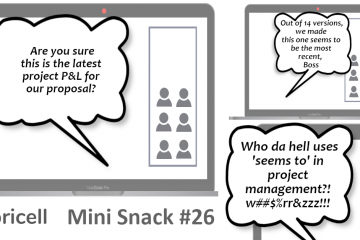
What is the Confusion?
For many of us, there is no confusion, but from my experience, there are several misperceptions, sometimes justified sometimes not.
So, what are we talking about?
We are talking about contracting professional services, and specifically contracting projects in new technologies, but not only.
Confusion can be expressed in the below statements:
- All Time and Material projects don’t have a scope.
- All Fixed Price projects have scope.
Because of the above Time and Material is interchangeably used with a No-scope project.
The same way if somebody is talking Fixed Price - he/she means Scope and Deliverables. Or if in presales discussions customer is talking Scope we immediately assume Fixed Price.
And let’s agree. Majority projects on Time and Material don’t have Scope. The same way most Scope is contracted on Fixed Price.
Introducing agile methodology additionally confused many people. And made a conflict of Time and Material and Fixed Price vs Scope more severe.
Lest try to sort out those terms and define relations between each other.
Fixed Price
Fixed Price is simply a billing method. It means that at the end of delivery a customer will pay a supplier a specific amount of money. Those payments can be split into multiple installments. But they always sum to the agreed amount.
How does this refer to Scope? In most cases, we associate the price (or part of it) to a specific scope. This is how delivery and payment are associated.
The association works the following: if we know scope we can estimate workload and other materials we add risk, and on top, we add all margin uplifts to create price. Fixed Price.
But this is not the only case. Fixed Price may come from not scope but fixed resources and time assigned to deliver.
Let’s look at the example.
We must deliver the requirements gathering service. We don't know exactly what we will deliver, except it will be a presentation for sponsors. What we know how we will deliver and what resources we need. We need industry expert and we need an analyst and a bit of project manager and based on previous experience 4 weeks to deliver.
This is all. Somebody may say this is scope. Not really - this is service.
Another example is an agile sprint. We know what roles we need and for how long. We definitely don't know what output will be (well, don't know insufficient details)
Time and Material
… similarly, as Fixed Price, this is just a billing method. And it has little to do with scope and deliverables. Many projects contracted on Time and Material have no scope, but many do.
Those with the scope are still the commitment of suppliers to deliver specific scope, while billing will be done based on consumed resources as we go.
A combination of Time and Material and Scope commitment is pretty risky for both sides. Yet attractive for supplier as for cash flow.
"A combination of Time and Material and Scope commitment is pretty risky for both sides. Yet attractive for supplier as for cash flow"
How to recognize the Time and Material billing and scope commitment? From the statement of work.
If we can find scope description clearly stated inside the SOW document, here it is. We have a scope and commitment.
Scope and Deliverables
I have seen Scope described one or another way, or both. In my opinion, having both is a way to go.
Defining services we really define how we going to work, what steps we will do, who will work, what are assumptions for work. It is a good method to define for example prototyping or mocking UX projects.
We don't say how the end product will look like, but how we going to get there we know how it will look like.
Another part is Deliverables. It is listing all outputs for the service. In principles, we list those deliverables which are some how-to interchange with a customer. Specific service can (and definitely will) produce many outputs, but not necessarily all are interested to customer.
Each deliverable should be linked to service and should have acceptance criteria if they are subject to acceptance by a customer.
Can we have fixed Price and Scope and deliverables? Yes, and this is a very common case.
Can we have Time and Material and have Scope and deliverables.
Yes, we can, but Time and Material and Scope combination, and specifically deliverables is very risky for supplier.
Final Conclusion
Fixed Price and Time and Material is billing method.
Scope and deliverables are a description of what has to be delivered.
All combinations of billing methods and scope are possible. Some are more commonly used. Some are risky. It is important to understand the implications of using all those combinations.
Understanding this will allow us to make the right decision on how to propose and how to calculate cost and risk – and finally price.
Modern CPQ solutions like pricell.io allow to calculate all billing types of the projects and add appropriate risk factor to cost and price.



